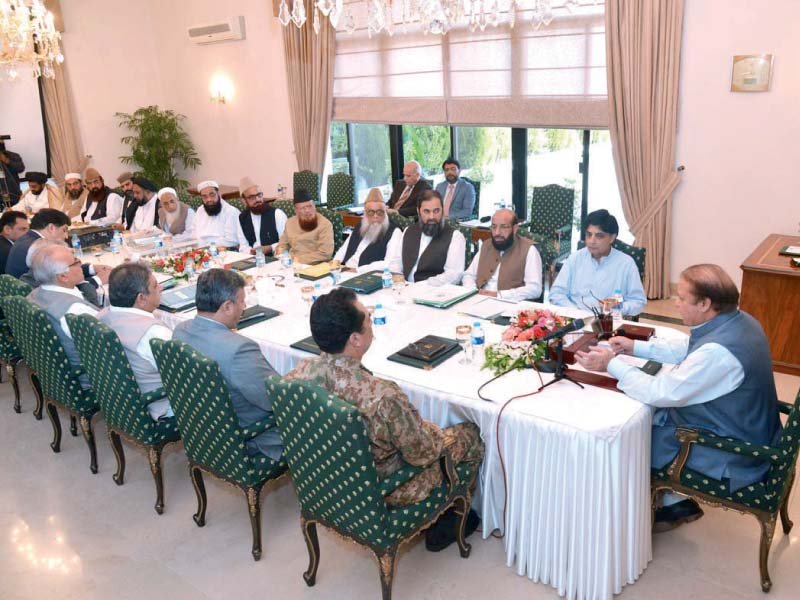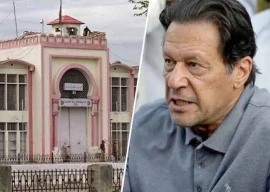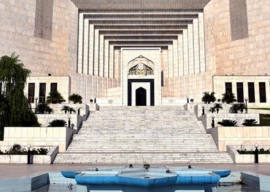
In the next phase of the national counter-terrorism plan, the government will launch a decisive crackdown against sectarian hate-mongers and all those madrassas that refuse to register under the new registration policy.
“We are going to wage a war against sectarianism. It is our biggest priority. Clerics have given us the go-ahead to take action against all the seminaries aiding, abetting or facilitating extremists and militants,” the country’s top security czar, Chaudhry Nisar Ali Khan, announced at a news conference on Monday.
The media interaction came soon after Army Chief General Raheel Sharif and Prime Minister Nawaz Sharif asked the country’s top clerics to “play their role in discouraging sectarianism and terrorism and to aid a campaign to eliminate such tendencies by developing a counter narrative”.
“It was our consensus [during Monday’s meeting] that any individual or institution involved in terrorist activities will face the law of the land,” the interior minister said.
The government has invited the army chief, ISI’s director general, four provincial and Gilgit-Baltistan chief ministers, AJK’s prime minister and other stakeholders to an important huddle on September 10 to discuss how to expedite implementation of the National Action Plan (NAP) against terrorism.
The crackdown on sectarian hatemongers will mainly focus on South Punjab where Malik Ishaq, the kingpin of the Lashkar-e-Jhanvi sectarian extremist group, was killed along with his two sons and top aides in an encounter on July 29, interior ministry officials said.

The provincial counter-terrorism force had mounted an intelligence-based crackdown against sectarian hatemongers soon after the Punjab home minister, Col (retd) Shuja Khanzada, was assassinated by a suicide bomber on August 16, they added. The anti-sectarianism crackdown will also focus on Karachi. The government will form two committees to oversee the crackdown against the clerics fuelling sectarian violence, particularly against the Shia community, Ahmadis and other minorities, said Nisar.
The Ittehad-e-Tanzeemul Madaris, a coalition comprising five bodies of religious seminaries belonging to different schools of thought, has assured the government that its madrassas would register under the new policy within three months, he added. It has also agreed to modernise the curricula of seminaries. A committee will be formed to review courses taught in the madrassas, he said, adding that the clerics have agreed to start ‘A’ and ‘O’ level classes at their seminaries.
“A seminary will be raided only when there is concrete evidence against it,” he said. “Under the new registration policy, it is mandatory for all madrassas to submit their annual audit reports and reveal their funding sources,” Nisar said and added that the registration process would be simplified.
“Relevant federal and provincial authorities and the scholars’ body will work together under a committee – answerable to the secretary interior – to evolve a comprehensive registration form aimed at gathering all credentials at a time,” he said. The government is also working out a method for the seminaries to receive funds from domestic and international donors, Nisar said. A meeting of the seminaries’ representatives will be arranged with the State Bank governor.
“Monday’s meeting largely admitted that it is not possible to defeat terrorism through use of force only. It also needs ideological means for which the government will have cooperation of religious scholars. De-radicalisation will be promoted in the country,” said the interior minister.
Earlier the prime minister, in his meeting with the Ittehad-e-Tanzeem-ul-Madaris delegation, said that establishment of peace in the country topped the government’s priorities.
The delegation comprised Dr Syed Muhammad Najfi, Syed Niaz Hussain Naqvi, Maulana Attaur Rehman, Maulana Yaseen Zafar, Sahibzada Abdul Mustafa Hazarvi, Maulana Abdul Malik, Professor Sajid Mir, Mufit Muneebur Rehman, Maulana Hanif Jalandhri and Mufti Muhammad Taqi Usmani. Premier Nawaz said the NAP implementation has already been started to purge the country of terrorism as the back of terrorists has been broken. The government wants to eliminate all the evils from the country and accomplishment of the NAP regardless of political associations.
He said the NAP was the most important agenda of Pakistan, being gradually implemented in all areas after a consensus was evolved by the national leadership. He added that consultation with management of seminaries was necessary for meaningful implementation of the NAP. Today’s meeting has been convened for such a consultation and the army chief is also present, he said.
The prime minister said the government realised the importance of seminaries and their positive role in the society. He assured the Ulema that his government was ready to assist the seminaries to introduce reforms in their education system. The delegation assured unconditional support for implementation of the NAP.
Published in The Express Tribune, September 8th, 2015.


1725443747-0/Untitled-design-(5)1725443747-0-165x106.webp)














COMMENTS (3)
Comments are moderated and generally will be posted if they are on-topic and not abusive.
For more information, please see our Comments FAQ